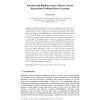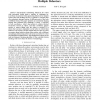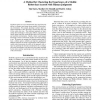364 search results - page 1 / 73 » Modelling Affect in Learning Environments - Motivation and M... |
UM
2007
Springer
13 years 10 months ago
2007
Springer
Accurately recognizing users’ affective states could contribute to more productive and enjoyable interactions, particularly for task-oriented learning environments. In addition t...
IJISTA
2007
13 years 4 months ago
2007
: This paper introduces a system for real-time incremental learning in a call-centre environment. The classifier used is a Support Vector Machine (SVM) and it is applied to telepho...
AIHC
2007
Springer
13 years 10 months ago
2007
Springer
Computer models can be used to investigate the role of emotion in learning. Here we present EARL, our framework for the systematic study of the relation between emotion, adaptation...
CEC
2009
IEEE
13 years 11 months ago
2009
IEEE
— Automatically synthesizing behaviors for robots with articulated bodies poses a number of challenges beyond those encountered when generating behaviors for simpler agents. One ...
AAAI
2000
13 years 5 months ago
2000
If robotic agents are to act autonomously they must have the ability to construct and reason about models of their physical environment. For example, planning to achieve goals req...



